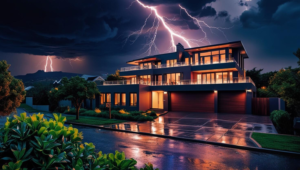How do I know if I need lightning protection?
Understanding the Need for Lightning Protection
Lightning is one of nature’s most powerful and unpredictable forces, capable of causing significant damage to both property and life. Every year, thousands of properties are affected by lightning strikes, leading to costly repairs and in some cases, severe injuries or fatalities. This makes understanding the need for lightning protection essential for homeowners and business owners alike.
Lightning protection involves a system designed to safeguard structures from the destructive effects of lightning strikes. It typically includes rods, cables, and grounding systems that are strategically placed to intercept lightning strikes and safely channel the energy into the ground. This prevents electrical surges that could ignite fires or damage electrical devices within your property.
The need for lightning protection is particularly acute in areas that experience frequent thunderstorms, but even locations with less severe weather conditions should consider it. Structures on high ground, isolated buildings, and properties with a lot of electronics or flammable materials are at a greater risk of lightning damage.
Moreover, as the threat of climate change increases, so does the likelihood of extreme weather events, including thunderstorms. This adds another layer of urgency to evaluating whether your property requires a lightning protection system.

Recognizing the potential risks and understanding how lightning protection works can help you make informed decisions about safeguarding your property. By investing in a proper lightning protection system, you not only protect your assets but also ensure the safety and peace of mind of everyone who occupies the space.
Risks of Lightning Strikes on Properties
Lightning strikes pose significant risks to properties, and understanding these dangers is crucial for property owners. A single strike can cause devastating damage, leading to costly repairs and endangering lives.
Firstly, consider the structural damage lightning can inflict. When lightning strikes a building, it often follows the path of least resistance, journeying through wiring or plumbing and potentially causing fires or explosions. Buildings with metal structures or those situated in open areas are particularly vulnerable.
Electrical systems are also at high risk. The immense electrical surge from a lightning strike can destroy appliances, fry wiring, and induce power surges. Sensitive electronics such as computers and home automation systems can be rendered useless, resulting in data loss and significant replacement costs.
Moreover, lightning poses a threat to roofs and external structures. A direct hit can dislodge tiles, damage chimneys, and even puncture roofing materials. Properties with significant height, such as towers or chimneys, are more susceptible to these types of damage.
Human safety is an equally critical concern. Occupants of a building are at risk of injury from fires sparked by a strike or from electrocution due to electrified surfaces. Lightning can also generate shockwaves that might harm inhabitants or even cause structural collapse.
In summary, the risks associated with lightning strikes are multifaceted, affecting structural integrity, electrical systems, and personal safety. Property owners should assess these risks carefully to determine if installing a lightning protection system is a prudent investment.
Key Indicators Your Property May Require Protection
Determining whether your property needs lightning protection involves evaluating several factors that may increase your risk for lightning strikes. First, consider your property’s geographical location. Areas prone to frequent thunderstorms, such as those in the “Lightning Alley” of the United States, have a higher likelihood of strikes. If your property is situated in such a region, additional protection might be essential.

Another indicator is the height and structure of your building. Taller structures or those built on elevated ground are more susceptible to lightning strikes. Similarly, if your property has a complex roofline or features tall elements like chimneys or antennas, these can act as lightning rods, drawing strikes directly.
The surrounding environment also plays a crucial role. If your property is located in an open area with few trees or tall structures nearby, it becomes a more inviting target for lightning. Conversely, densely forested regions may offer some natural protection but can also pose risks if lightning strikes nearby trees.
Consider the materials used in your building’s construction. Metallic frameworks and roofs can increase vulnerability, while buildings with flammable materials require even more attention due to the risk of fire.
Finally, it’s important to assess the value and sensitivity of the electronic equipment within your property. Modern homes and businesses often contain sensitive electronics that can be severely damaged by a direct strike or power surge.
By evaluating these indicators, you can make a more informed decision on whether lightning protection is a necessary safeguard for your property, potentially saving you from costly damages and ensuring peace of mind during stormy seasons.
Benefits of Installing Lightning Protection Systems
Installing a lightning protection system can significantly safeguard your property against the devastating effects of lightning strikes. These systems do not attract lightning; instead, they provide a safe path for the electrical discharge to follow, minimizing potential damage. Here’s why investing in a lightning protection system is a wise decision.
Firstly, lightning protection systems reduce the risk of fire. Lightning can ignite combustible materials within a building, leading to catastrophic fires. By directing the electrical surge safely to the ground, these systems prevent such occurrences, ensuring the safety of both the property and its occupants.
Secondly, they protect your expensive electronics and appliances. A lightning strike can cause electrical surges powerful enough to destroy or damage electronic devices beyond repair. Surge protectors alone might not be sufficient during a direct lightning strike, but a well-designed protection system can keep your electronic investments safe.
Moreover, these systems can protect structural integrity. The immense energy in a lightning bolt can cause structural damage, such as cracks and compromised building materials. By safely redirecting the energy, a lightning protection system preserves the building’s overall integrity.
Finally, lightning protection systems can offer peace of mind. Knowing your property is protected during a storm can alleviate anxiety, enabling you to focus on what matters without worrying about potential lightning damage.
In conclusion, installing a lightning protection system is not just about preventing damage; it’s about safeguarding your property investment, ensuring the safety of its occupants, and providing peace of mind during turbulent weather.
When you’re trying to figure out if your property needs a lightning protection system, assessing its vulnerability is crucial. Here’s a straightforward approach to evaluating your risks and making an informed decision.
First, consider your geographical location. Areas that experience frequent thunderstorms are more susceptible to lightning strikes than those with calmer weather patterns. If you’re in a region prone to storms, your property’s risk increases significantly.
Next, assess the height and structure of your building. Taller structures, or those situated on higher ground, are natural targets for lightning strikes. Similarly, buildings made of materials that conduct electricity, like metal or those with large amounts of wiring or water systems, also face heightened risks.
Additionally, think about the potential consequences of a lightning strike. If your property houses valuable equipment, like electronics or machinery, or contains flammable materials, the damage can be extensive and costly. In such situations, investing in lightning protection could save you from significant financial loss or even tragic outcomes.
You should also examine the frequency and cost of insurance claims related to lightning incidents in your area. If claims are common and policies are costly, installing a lightning protection system might reduce your premiums over time.
Finally, consult a professional to perform a risk assessment. They can provide detailed insights specific to your property and recommend actions tailored to your needs.
By comprehensively evaluating these factors, you can make a knowledgeable choice about whether investing in a lightning protection system is the right decision for your property.
Making an Informed Decision on Lightning Protection
Making the right decision about lightning protection is crucial for safeguarding your property and ensuring peace of mind. Lightning strikes are unpredictable and can cause significant damage to both residential and commercial properties. By understanding the risks and evaluating your property’s vulnerability, you can determine if a lightning protection system is a wise investment.
Start by assessing the geographical location of your property. Areas prone to storms and high lightning activity are at increased risk and more likely to benefit from protection systems. Additionally, consider the structure of your building. Properties with tall or isolated features, like chimneys, towers, or water tanks, are more susceptible to strikes.
Evaluate the potential consequences of a strike on your property. Damage can be physical, affecting structures and electronic systems, or financial, incurring costly repairs and replacements. If your property houses sensitive equipment or valuable items, the risk becomes even more significant.
Consulting with a professional who specializes in lightning protection can offer valuable insights. They can conduct a thorough assessment and suggest tailored solutions based on your property’s specific needs.
Remember, a lightning protection system not only protects your property but also ensures the safety of its occupants. Investing in such a system can save you from unexpected financial burdens and provide reassurance during stormy seasons. Make an informed decision by weighing the risks, benefits, and costs associated with installing a lightning protection system.
Want to find out how to uncover electrical faults quickly? Read our recent article to discover more…
